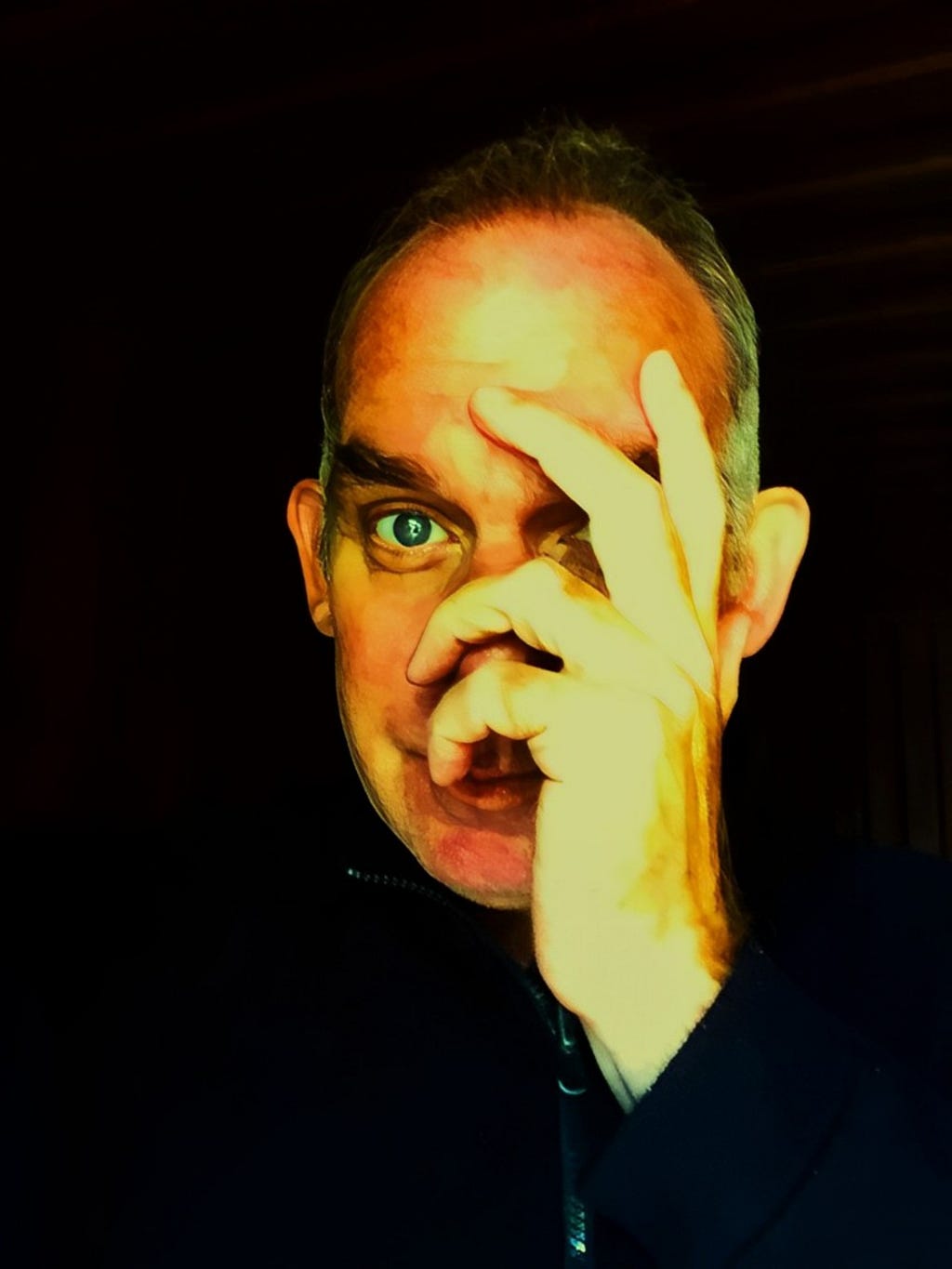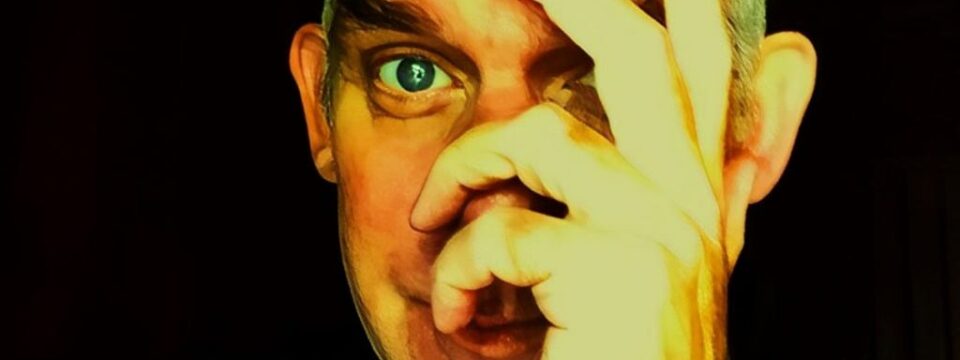
The problem with social change and positive impact now is that each side thinks they’re on the right side of whatever that is. The left thinks that being pro-Palestine, high tax, no borders, environmentally aware, pro-Trans and anti-racist are positive changes, while the right thinks that Israel’s right to defend itself, low taxes, national integrity, climate realism, biological naturalism and ‘content of character’ are more important. Commercial forces in the media know that binary positions and conflict are profitable, and we really need a way to get beyond the impasse.
As a part of our series about leaders who are using their social media platform to make a significant social impact, we had the pleasure of interviewing Sean Bw Parker.
Sean Bw Parker (MA) is a writer, artist, and musician specialising in cultural theory, poetry, and justice reform, and lives in Worthing, UK. After gaining a Masters degree in Fine Art from the University for the Creative Arts in 2003, he lived in Istanbul for ten years where he taught English and cultural studies and became successful on the music scene. He has published or contributed to a number of books and albums, appeared in many publications and on shows or podcasts, had artwork displayed at exhibitions, and given a TED talk. His book Compelling Speech — The Stammering Enigma won a Platinum Koestler Arts award in 2023.
Thank you so much for joining us in this interview series! Can you tell us a story about what brought you to this specific career path?
Since falling in love with various forms of expressive art as a teenager, I’ve honed my specialities in painting through six years at art school (the University for the Creative Arts in Surrey), music over ten years living in Istanbul, and writing on cultural theory and justice reform since returning to the UK in 2014. Life events and changing attitudes have contributed to the dynamics of this.
Can you share the most interesting story that happened to you since you began this career?
I was only intending to visit returned friends when I visited Istanbul following my masters in 2004. I thought Turkey was a part of the EU, but realised a few months into my visit that I had become an ‘illegal immigrant’ due to overstaying my visitor’s visa. Due to getting on with creative life/putting it out of my mind, I lived there ‘under the radar’ for the next ten years, before a dispute with a neighbour led to my being deported in 2014. I recorded three albums, played a number of festivals and big shows, lectured at Istanbul University, gave a TED talk and became the leading international artist in the country in the meantime however.
It has been said that our mistakes can be our greatest teachers. Can you share a story about the funniest mistake you made when you were first starting? Can you tell us what lesson you learned from that?
I’m not sure about funniest, and it wasn’t so much at the start of my career, but opening an arts venue without a business plan and in a relatively unknown new town might be considered a ‘mistake’. I don’t really consider learning experiences mistakes though, and the place was very successful for the year it was in existence (2016). The council not liking our stretching of the definition of cafe/restaurant licence and internal politics combined, among other things, to put it in the ‘mixed success’ category.
You have been blessed with success in a career path that can be challenging. Do you have any words of advice for others who may want to embark on this career path, but seem daunted by the prospect of failure?
If you don’t try, you’ll never know. Being prepared is as important as being enthusiastic, and the most successful will combine the two with a sense of long-termism. If you’re easily put off by what looks like early failure, go at things in more gradual stages.
Ok super. Let’s now jump to the core focus of our interview. Can you describe to our readers how you are using your platform to make a significant social impact?
The integrity of the arts in a time of ‘cancel culture’ is under massive threat if you don’t go along with approved societal groupthink. Some platforms seem to prize free speech and the spirit of independence more than others, and I try to amplify that kind of thinking in re-elevating sovereign creative expression to its rightful, independent place.
Can you tell us a story about a particular individual who was impacted by this cause?
Sean Corby is a jazz trumpeter who was working for ACAS, the UK university educational organisation. In a meeting he called out the cyclical thinking of critical race theory, as he wouldn’t accept that if he wasn’t ‘part of the solution, he was part of the problem’. For the record, Corby is married to a woman of colour, and of course specialises in jazz, a music genre steeped in black culture. He stood his ground, was disciplined, he sued, and won. An organisation to which I contribute, Dr Michael Naughton’s Empowering The Innocent (ETI) recently re-published his story.
Was there a tipping point that made you decide to focus on this particular area? Can you share a story about that?
Since 2014 there has been an almost tangible feeling in culture that diversity, equity and inclusion (DEI) policies, combined with the Equality Act in the UK, have been squeezing the spirit and soul out of the arts. There is an intolerable new story in the media almost every day, but George Orwell being put on a list of ‘problematic authors’ by British libraries was a good example of ‘enough is enough’, for me at least.
Are there three things the community/society/politicians can do to help you address the root of the problem you are trying to solve?
It is labelled a ‘culture war’ issue, and is too easily delineated in legacy and social media as left versus right. It’s actually about liberal individualism vs authoritarianism, and can be found at either end. This was the core of my 2024 book A Delicate Balance Of Reason — Adventures In The Culture Wars. The Free Speech Union in the UK, the FIRE organisation in the US, the Academy of Ideas and the Free Speech Nation weekly television show are all raising the profile of the problem, as more and more people are cancelled or sacked without knowing why or how to fight back.
Why do you think social media in particular has the power to create social change and create a positive impact on humanity?
The problem with social change and positive impact now is that each side thinks they’re on the right side of whatever that is. The left thinks that being pro-Palestine, high tax, no borders, environmentally aware, pro-Trans and anti-racist are positive changes, while the right thinks that Israel’s right to defend itself, low taxes, national integrity, climate realism, biological naturalism and ‘content of character’ are more important. Commercial forces in the media know that binary positions and conflict are profitable, and we really need a way to get beyond the impasse.
What specific strategies have you been using to promote and advance this cause? Can you recommend any good tips for people who want to follow your lead and use their social platform for a social good?
I am a coordinator for FASO, the false allegations support organisation, ETI, FACT (falsely accused carers and teachers association), a member of Academics For Academic Freedom, contributor to the New English Review and regular sharer and contributor to the aforementioned organisations. I create my own stories around whatever is happening at the time, but also try to add nuance that might not have been covered before. I don’t like just repeating groupthink stances on either side — I like to promote the cause of (classical) liberalism with reality, sense and hopefully a degree of British wit.

What are your “5 things I wish someone told me when I first started” and why? Please share a story or example for each.
- That some people would rather not talk about a problem than deal with it.
- That both local and national politicians are entirely interested in their own careers, and how they appear.
- That people are evolutionarily hardwired to resist new information if it goes against their established stance.
- That social media is now absolutely full of bad-faith rhetorical extrapolation.
- That just because you are trying to do interesting and exciting things, not everyone will approve or support.
You are a person of enormous influence. If you could inspire a movement that would bring the most amount of good to the most amount of people, what would that be? You never know what your idea can trigger. 🙂
I think these things are gradual, but it’s hard to ignore the fact that social media has, after twenty years, become the ‘town square’, whichever platform you’re using. This also means that how things appear is more important than what they actually are, which is a ‘victory’ for postmodern theory. It’s also the logical conclusion of the technologised entertainment industry. Making tech become the medium rather than the message would be good — but these things need to happen organically, like language. They’re impossible to force.
Is there a person in the world, or in the US whom you would love to have a power lunch with, and why? He or she might just see this, especially if we tag them. 🙂
Probably Chuck D (Public Enemy).
How can our readers further follow your work online?
Music: https://open.spotify.com/artist/54AfbvLmprsXNalXs2xUJi
Books: https://www.amazon.co.uk/stores/author/B06XZ76F5Y
Videos: https://www.youtube.com/channel/UCUJPU5UtyFDLP8R5kR9jJkA
News: https://twitter.com/seanbwparker?ref_src=twsrc%5Egoogle%7Ctwcamp%5Eserp%7Ctwgr%5Eauthor
This was very meaningful. Thank you so much!
Social Media Stars Making a Social Impact: Why & How Sean Bw Parker Is Helping To Change Our World was originally published in Authority Magazine on Medium, where people are continuing the conversation by highlighting and responding to this story.
